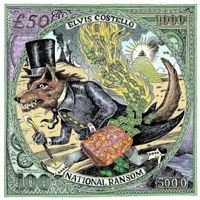Difference between revisions of "Ransom"
m (Text replacement - "http://" to "https://") |
|||
| (One intermediate revision by the same user not shown) | |||
| Line 2: | Line 2: | ||
==Origin== | ==Origin== | ||
| − | [ | + | [https://nordan.daynal.org/wiki/index.php?title=English#ca._1100-1500_.09THE_MIDDLE_ENGLISH_PERIOD Middle English] ''ransoun'', from Anglo-French ''rançun'', from [[Latin]] ''[[redemption]]''-, redemptio |
| − | *[ | + | *[https://en.wikipedia.org/wiki/13th_century 13th Century] |
==Definitions== | ==Definitions== | ||
*1: a [[consideration]] paid or demanded for the release of someone or something from [[captivity]] | *1: a [[consideration]] paid or demanded for the release of someone or something from [[captivity]] | ||
| Line 9: | Line 9: | ||
*3: A sum of [[money]], esp. a large one, such as one might pay as a punitive fine or as a payment for the return of a [[hostage]]. | *3: A sum of [[money]], esp. a large one, such as one might pay as a punitive fine or as a payment for the return of a [[hostage]]. | ||
==Description== | ==Description== | ||
| − | '''Ransom''' is the [[practice]] of holding a [[prisoner]] or item to extort [[money]] or [[property]] to secure their release, or it can refer to the sum of [[money]] involved. In an early German law, a similar concept was called [ | + | '''Ransom''' is the [[practice]] of holding a [[prisoner]] or item to extort [[money]] or [[property]] to secure their release, or it can refer to the sum of [[money]] involved. In an early German law, a similar concept was called [https://en.wikipedia.org/wiki/Weregild Weregild]. |
| − | In Europe during the [ | + | In Europe during the [https://en.wikipedia.org/wiki/Middle_Ages Middle Ages], ransom became an important [[custom]] of [[chivalric]] [[warfare]]. An important knight, especially [[nobility]] or [[royalty]], was worth a significant sum of [[money]] if captured, but nothing if he was [[killed]]. For this reason, the [[practice]] of ransom contributed to the [[development]] of [https://en.wikipedia.org/wiki/Heraldry heraldry], which allowed knights to advertise their [[identities]], and by implication their ransom [[value]], and made them less likely to be killed out of hand. Examples include [https://en.wikipedia.org/wiki/Richard_the_Lion_Heart Richard the Lion Heart] and [https://en.wikipedia.org/wiki/Bertrand_du_Guesclin Bertrand du Guesclin]. |
When ransom means "payment", the [[word]] comes via Old French rançon from [[Latin]] redemptio = "buying back": compare "[[redemption]]". | When ransom means "payment", the [[word]] comes via Old French rançon from [[Latin]] redemptio = "buying back": compare "[[redemption]]". | ||
| Line 17: | Line 17: | ||
In Judaism ransom is called ''kofer-nefesh'' (Hebrew: כפר נפש). Among other uses, the [[word]] was applied to the poll [[tax]] of a half shekel to be paid by every [[male]] above twenty years at the [[census]]. | In Judaism ransom is called ''kofer-nefesh'' (Hebrew: כפר נפש). Among other uses, the [[word]] was applied to the poll [[tax]] of a half shekel to be paid by every [[male]] above twenty years at the [[census]]. | ||
| − | Although ransom is usually demanded only after the kidnapping of a [[person]], it is not unheard of for [[thieves]] to demand ransom for the return of an inanimate object or body part. In 1987, thieves broke into the tomb of Argentinian president [ | + | Although ransom is usually demanded only after the kidnapping of a [[person]], it is not unheard of for [[thieves]] to demand ransom for the return of an inanimate object or body part. In 1987, thieves broke into the tomb of Argentinian president [https://en.wikipedia.org/wiki/Juan_Per%C3%B3n Juan Perón] and stole his hands; they later demanded $8 million US for their return. The ransom was not paid. |
==See also== | ==See also== | ||
*'''''[[Redemption]]''''' | *'''''[[Redemption]]''''' | ||
[[Category: Anthropology]] | [[Category: Anthropology]] | ||
Latest revision as of 02:32, 13 December 2020
Origin
Middle English ransoun, from Anglo-French rançun, from Latin redemption-, redemptio
Definitions
- 1: a consideration paid or demanded for the release of someone or something from captivity
- 2: The action or means of freeing oneself from a penalty; a sum of money paid to obtain pardon for an offence or imposed as a penalty, esp. one exacted for a significant offence; a fine.
- 3: A sum of money, esp. a large one, such as one might pay as a punitive fine or as a payment for the return of a hostage.
Description
Ransom is the practice of holding a prisoner or item to extort money or property to secure their release, or it can refer to the sum of money involved. In an early German law, a similar concept was called Weregild.
In Europe during the Middle Ages, ransom became an important custom of chivalric warfare. An important knight, especially nobility or royalty, was worth a significant sum of money if captured, but nothing if he was killed. For this reason, the practice of ransom contributed to the development of heraldry, which allowed knights to advertise their identities, and by implication their ransom value, and made them less likely to be killed out of hand. Examples include Richard the Lion Heart and Bertrand du Guesclin.
When ransom means "payment", the word comes via Old French rançon from Latin redemptio = "buying back": compare "redemption".
In Judaism ransom is called kofer-nefesh (Hebrew: כפר נפש). Among other uses, the word was applied to the poll tax of a half shekel to be paid by every male above twenty years at the census.
Although ransom is usually demanded only after the kidnapping of a person, it is not unheard of for thieves to demand ransom for the return of an inanimate object or body part. In 1987, thieves broke into the tomb of Argentinian president Juan Perón and stole his hands; they later demanded $8 million US for their return. The ransom was not paid.
